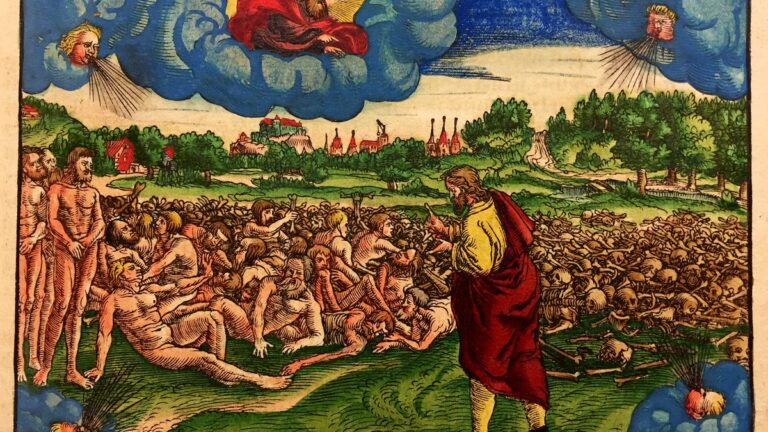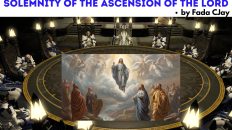IF DRY BONES COULD RISE AGAIN, THEN THERE IS HOPE IN WHAT SEEMS HOPELESS BEFORE YOU
First Reading: Ezekiel 37:1-14
Responsorial Psalm: Ps. 106(107):2-9
Gospel Reading: Matthew 22:34-40
_____________________________________________
The Italian writer and poet, Dante Alighieri in his work “Divine Comedy” writes: “At the gate of hell it is written: ‘abandon hope all ye who enter here!’” For the poet, hellfire or the state of hellfire is synonymous with hopelessness. A place where despair is final; where suffering and circumstances of pain cannot be remedied; where evil and eternal damnation have the last word; where there is no chance for repentance; where the joy of God’s presence is not felt, etc. Thus, if hell is marked by hopelessness, Heaven (the ‘dwelling place’ of God) can be described as the opposite; it is the fullness of hope because we have a God to whom all things are possible. This hope is communicated to us here on earth in order to look forward to being with God in the afterlife; in order to look beyond the pains, challenges, and sufferings of this life with a hopeful sense of a life of happiness and joy in the future. This idea makes sense as we contemplate today’s readings which drive messages of hope in hopeless situations.
The first reading is taken from the book of Ezekiel (as stated above). Ezekiel was a contemporary prophet of Daniel. He prophesied in the Southern Kingdom in one of the most critical periods in its history when the Babylonian captivity took place, in which the city of Jerusalem was under siege for a while, then the Babylonian army invaded the city, took the lives of many, burned the temple and took the most qualified to Babylon condemning the others who were left in a hopeless state with no chance of surviving. One of these ten thousand exiles was the prophet Ezekiel who, unlike Daniel that stayed in the Palace, he (Ezekiel) was among his people and his mission was before the sad and hopeless scenario, to bring a message of hope and words of encouragement to the hopeless and suffering people. For Ezekiel, although the situation was dire, God would intervene and restore the nation. There was hope for Israel. In fact, Ezekiel’s book is mostly made up of promises of restoration – a message of hope for a time of hopelessness. The text we read today speaks of the vision, regarding the “Valley of dry bones” that represented Israel. Faced with this scenario, the Lord asked the prophet to prophesy and what seemed impossible and improbable happened – the dry bones came together, enclosed with tendons (sinews) and skin; then he prophesied again and they were filled with the Holy Spirit (Ruah-wind-spirit, the breath of life in all four directions, life everywhere). Needless to say, the Holy Spirit penetrated them and they rose to form a great army. God Himself explains to Ezekiel that this vision points to what He was going to do by restoring Israel and bringing them back to life. Here, God’s Word becomes Reality. We are at the central axis of the vision, the parable and theology of this passage from the book of Ezekiel revitalize hope and dispel despair. It is a call to strengthen our trust and hope in God, who out of His loving mercy, brings new life from dead and decaying situations.
Similarly, in today’s gospel, Jesus’ response to the question put before Him brought about hope to the possibility of living out the Law. We are told that the Pharisees, to disconcert Jesus brought up a question: ‘Master, which is the greatest commandment of the Law?’ This was considered quite a difficult question because the religious authorities multiplied the Law of God up to 613 commandments, with 365 prohibitions and 248 obligations; such that keeping the law became a burden on the people, as they were often held accountable for any law violated. In the midst of this difficult situation, Jesus’ simple response (in spite of the questionable motivation behind the question) brought about an answer that is worth pondering upon, and indeed one that restores our hope in observing the law – the love of God and the love of our neighbour.
Dearest friends in Christ, today’s message presents us with hope in the face of sufferings and difficulties – pain, sicknesses, etc. St. Paul reminds us in Romans 8:18 that our present sufferings cannot be compared to the glory that will be revealed in the future. Here, Paul points us forward to what we can hope for in Christ and how God is at work in the nitty-gritty of life through the Holy Spirit and divine providence. You may be a person who struggles to look beyond the present hardships; this passage would invite you to consider where your hope truly lies. On the other side, it could be that you have a naive optimism and dismiss the challenges that are part of life. It is only in hell that hope ceases; so far there is life, there is also hope. Thus, today’s message invites you to be real about the suffering and circumstances in this world, but look with hope to the resources that God gives you in the Holy Spirit; as the Catechism of the Catholic Church says: “We can, therefore, hope in the glory of heaven promised by God to those who love him and do His will. In every circumstance, each one of us should hope, with the grace of God, to persevere ‘to the end’ and to obtain the joy of heaven, as God’s eternal reward for the good works accomplished with the grace of Christ.” Above all, in the spirit of hope, like today’s psalmist, we should “Give thanks to the Lord; his love is everlasting.”
Shalom!
© Fr. Chinaka Justin Mbaeri, OSJ
Paroquia Nossa Senhora de Fatima, Vila Sabrina, São Paulo, Brazil
nozickcjoe@gmail.com / fadacjay@gmail.com




